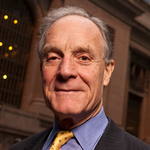Risk: Retrospective Lessons & Prospective Strategies Speakers
From Santa Fe Institute Events Wiki
SFI ACtioN Topical Meeting
Co-organzied by Morgan Stanley
October 4, 2018
Venue: Morgan Stanley: New York, NY
Panelists and moderators will include:
Cliff Asness
Founder, Managing Principal and Chief Investment Officer at AQR Capital Management

Cliff is a Founder, Managing Principal and Chief Investment Officer at AQR Capital Management. He is an active researcher and has authored articles on a variety of financial topics for many publications, including The Journal of Portfolio Management, Financial Analysts Journal and The Journal of Finance. He has received five Bernstein Fabozzi/Jacobs Levy Awards from The Journal of Portfolio Management, in 2002, 2004, 2005, 2014 and 2015. Financial Analysts Journal has twice awarded him the Graham and Dodd Award for the year’s best paper, as well as a Graham and Dodd Excellence Award, the award for the best perspectives piece, and the Graham and Dodd Readers’ Choice Award. In 2006, CFA Institute presented Cliff with the James R. Vertin Award, which is periodically given to individuals who have produced a body of research notable for its relevance and enduring value to investment professionals. Prior to cofounding AQR Capital Management, he was a managing director and director of quantitative research for the Asset Management Division of Goldman, Sachs & Co. He is on the editorial board of The Journal of Portfolio Management, the governing board of the Courant Institute of Mathematical Finance at NYU, the board of directors of the Q-Group and the board of the International Rescue Committee. Cliff received a B.S. in economics from the Wharton School and a B.S. in engineering from the Moore School of Electrical Engineering at the University of Pennsylvania, graduating summa cum laude in both. He received an M.B.A. with high honors and a Ph.D. in finance from the University of Chicago, where he was Eugene Fama’s student and teaching assistant for two years (so he still feels guilty when trying to beat the market).
Rick Bookstaber
Chief Risk Officer, Office of the CIO, University of California

Rick is the author of The End of Theory (2017, Princeton University Press), which critiques the applicability of economics in dealing with financial crises, and proposes an alternative paradigm using agent-based models. He is also the author of A Demon Of Our Own Design (2007), a book highlighting the fragility of the financial system that occurs from tight coupling and complexity. The book is noted for its foreshadowing of the financial crisis of 2007–08.
He has worked in risk management with chief risk officer roles on both the buy-side at Moore Capital and Bridgewater, and on the sell-side at Morgan Stanley and Salomon, and from 2009 to 2015 he served in the public sector at the SEC and the U.S. Treasury, drafting the Volcker Rule, building out the risk management structure for the Financial Stability Oversight Council, and developing an agent-based model to assess financial vulnerabilities.
Currently, he is the Chief Risk Office for the Office of the CIO at the University of California, overseeing their $110 billion pension and endowment portfolios. In this role he is continuing to apply agent-based models for risk management.
He received a Ph.D. in economics from MIT. He is currently working on a book that looks at the rise and fall of civilizations through the lens of complexity.
Colin Camerer
Robert Kirby Professor of Behavioral Economics, CalTech

Colin Camerer is a pioneer in behavioral economics and in neuroeconomics. He is interested in how psychological forces and their deeper neuroscientific foundations influence economic decisions involving individuals and markets. In his research, he uses experiments to better understand how individuals and markets function, neuroscience to gain insight into the neuroscientific drivers for decision making and behavior, and game theory. For example, he's exploring why price bubbles form, when they crash, and how people value immediate and future rewards and costs—especially those that create temptation. He wants to understand strategic situations such as when other people's choices affect an individual and how someone anticipates what others will do.
Camerer was on the faculty of the Graduate School of Business at the University of Chicago from 1991 to 1994, the Wharton School of the University of Pennsylvania from 1983 to 1991, and the Kellogg Graduate School of Business at Northwestern University from 1981 to 1983. He was a visiting fellow at Stanford University from 1997 to 1998, a visiting scholar at the Russell Sage Foundation between 1991 and 1992, and a visiting professor of business at Caltech in 1987.
He is a member of the American Academy of Arts and Sciences (2003), a fellow of the Econometric Society (1993), and a fellow of the Society for the Advancement of Economic Theory (2011). He was president of the Society for Neuroeconomics (2005–2006) and president of the Economic Science Association (2001–2003). Since 2007, he has been a chair of the Russell Sage Foundation Behavioral Economics Roundtable. He has one patent accepted on "Active Learning Decision Engines." He is on editorial boards for numerous journals. In 2013, he was named a MacArthur Fellow.
Esther Dyson
Chairman of EDventure Holdings

Esther Dyson is a journalist, author, businesswoman, investor, commentator and philanthropist. She is a leading angel investor focused on breakthrough efficacy in healthcare, government transparency, digital technology, biotechnology, and space. Dyson is currently focusing her career on health and continues to invest in health and technology startups.
Charley Ellis
Founder of Greenwich Associates; Member, Advisory Board, Wealthfront

Charley Ellis is the founder of Greenwich Associates, the leading research-based strategy consulting firm to the financial services industry, and a member of the advisory board at Wealthfront. Charley has written 16 books on individual investing, including the classic Winning the Loser’s Game.
Charley chaired the CFA Institute, served on the faculty of Harvard Business School and the Yale School of Management, and chaired the investment committee at Yale University. Yale, led by its Chief Investment Officer, David Swensen, is viewed by many as the best large diversified portfolio manager in the world. Charley also served on the Vanguard Group board of directors for almost a decade.
Among Charley’s books is The Elements of Investing, which is considered one of the simplest, clearest books about investing ever written.

Jessica is a professor at SFI where she also runs the Collective Computation Group with David Krakauer. They work on fundamental problems in evolutionary theory concerning collective behavior, collective computation, and collective intelligence—at all levels of biological organization—from societies of cells to societies of individuals to machine-human hybrid societies. They use insights and tools from biology, evolutionary theory, evo-devo, statistical physics, cognitive science and neuroscience, complexity science, animal behavior, information theory, theoretical computer science, and dynamical systems.
Their work is empirically grounded and often motivated by deep understanding of finite, heterogenous, and typically relatively small model systems in which components have only partly overlapping interests and are noisy information processors dealing with noisy signals. So far they have worked with neural data, data from animal societies, slime moulds, and data from human societies.
Her particular interests are in the role of collective computation/intelligence in the origin of space and time scales and in the emergence of robust structure and function in nature and society. And she is fascinated with the idea that components in adaptive systems construct their macroscopic worlds through collective coarse-graining in evolutionary and/or learning time.

Jessica is a professor at SFI where she also runs the Collective Computation Group with David Krakauer. They work on fundamental problems in evolutionary theory concerning collective behavior, collective computation, and collective intelligence—at all levels of biological organization—from societies of cells to societies of individuals to machine-human hybrid societies. They use insights and tools from biology, evolutionary theory, evo-devo, statistical physics, cognitive science and neuroscience, complexity science, animal behavior, information theory, theoretical computer science, and dynamical systems.
Their work is empirically grounded and often motivated by deep understanding of finite, heterogenous, and typically relatively small model systems in which components have only partly overlapping interests and are noisy information processors dealing with noisy signals. So far they have worked with neural data, data from animal societies, slime moulds, and data from human societies.
Her particular interests are in the role of collective computation/intelligence in the origin of space and time scales and in the emergence of robust structure and function in nature and society. And she is fascinated with the idea that components in adaptive systems construct their macroscopic worlds through collective coarse-graining in evolutionary and/or learning time.

